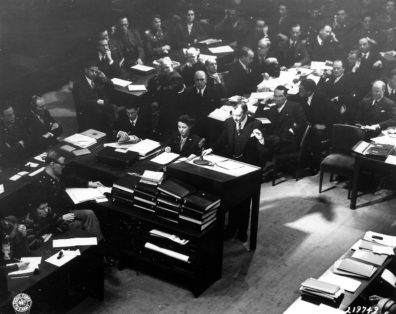
U.S. Supreme Court Justice Robert H. Jackson, appointed by President Truman to serve as United States Chief of Counsel to prosecute Nazi war criminals, delivers his opening statement to the four-nation International Military Tribunal (IMT) at Nuremberg on November 21, 1945. Here are five segments of Jackson’s speech, which is deemed a forensic masterpiece: (1) at the call of IMT President Lord Geoffrey Lawrence (UK), Jackson begins; defense attorneys sit in the background; (2) Jackson speaks, assisted by his secretary Elsie Douglas and his son and executive assistant, attorney William E. Jackson; the camera pans across the defense attorneys and then the 21 defendants; (3) as Jackson continues, the camera pans across UK chief prosecutor Hartley Shawcross and deputy David Maxwell Fyfe and then to the 8 judges on the bench, including U.S. judge Francis Biddle and U.S. alternate judge John J. Parker; (4) Jackson speaks and the defendants listen; (5) Jackson addresses the imperfection but sufficiency of the case that prosecutors will present.
Produced by US Army Signal Corps 1945-1956, housed in National Archives and Records Administration (NARA). Digitized and provided by The United States Holocaust Memorial Museum; Steven Spielberg Film and Video Archive.
Robert H. Jackson's Notes
So the task that immediately fell to me was to prepare the opening speech which I would deliver, and to get the evidence arranged for presentation in the following week to support my opening remarks. The speech seemed an important task to me because up to that time no one had disclosed to the world what the case really amounted to, what the evidence was and what law we were contending for.
The speech also seemed to have important public consequences because it would be the first full disclosure of the materials that we had captured and had at hand, and of the use we attempted to make of them. I had a rather strong sense of responsibility about the speech and recognized that it was probably the most important task of my life.
The Reminiscences of Robert H. Jackson Columbia Univ. Oral History Research Office, 1955, Pages 1390-1392
